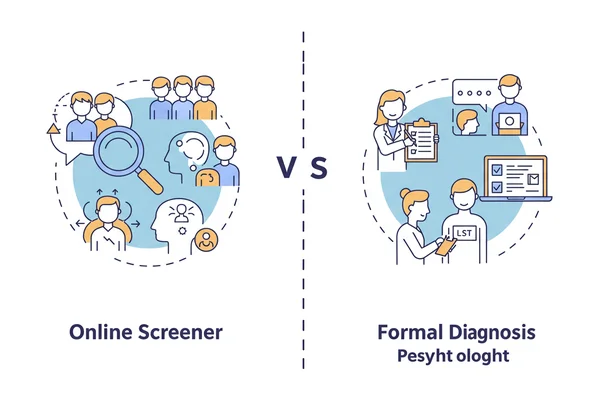Understanding Your Aspergerstest.me Score: Practical Next Steps After Your Online Asperger's Test
Receiving a high score on an online aspergers test can bring a wave of complex emotions. You might feel a sense of validation, a profound relief that your lifelong experiences finally have a name, or perhaps a bit of confusion about what it all means. Can I test myself for Asperger's? While online screeners are a powerful tool for self-discovery, they represent the beginning of a journey, not the final destination. This guide provides clear, compassionate, and practical steps to help you navigate your results and move forward with confidence and understanding.
This moment marks a significant step in understanding yourself better. It's an opportunity to explore your unique neurotype with curiosity and kindness. A well-designed screening, like the one offered on our site, can serve as your initial guide.

Understanding Your High Asperger's Score: What It Means & Doesn't Mean
Before diving into action, it's essential to frame your result correctly. A score on an online test is a piece of data, a clue that points you toward a deeper understanding of yourself. It is not a label or a limitation. Let's unpack what your score signifies and, just as importantly, what it does not.
Initial Reactions: Validation, Relief, or Uncertainty?
It's completely normal to feel a mix of emotions right now. For many adults, a high score on an Asperger's screening test is the first time their internal world has been reflected back at them. This can bring a sense of relief, confirming that you're not "broken" or "weird," but simply wired differently. You may also feel a sense of validation, as lifelong challenges with social cues or sensory overload are put into a new context. At the same time, uncertainty about the future is a common and understandable reaction. Acknowledge and accept all of these feelings without judgment; they are all part of the process.
Screeners vs. Diagnosis: The Crucial Distinction
This is the most critical concept to grasp. An online screening tool, even one based on scientifically validated questionnaires like the Autism-Spectrum Quotient (AQ) or the RAADS-R, is not a medical diagnosis. Think of it as a highly effective filter. It's designed to indicate whether you have a significant number of traits associated with the autism spectrum. A formal diagnosis, however, can only be given by a qualified healthcare professional, such as a psychologist or psychiatrist, after a comprehensive evaluation. Our online Aspergers test serves as a reliable starting point for self-reflection and can be an invaluable resource to bring to a professional.

What to Do After Your Asperger's Test: Practical First Steps
With a clearer understanding of your result, you can now take proactive steps. This isn't about "fixing" anything; it's about learning to thrive as you are. The focus should be on gathering more personalized information and building strategies that align with your neurotype.
Review Your Personalized AI Report for Deeper Insights
A simple score is just a number. The real value lies in understanding the patterns behind it. This is where our unique AI-powered analysis comes in. It goes beyond the score to provide a detailed, personalized report on your specific traits, potential strengths, and challenges. This report can illuminate why you excel at detail-oriented tasks but find small talk draining, or why you have deep, passionate interests. It translates your answers into actionable insights, making it the most logical and empowering next step. You can unlock your report to get a much deeper understanding of your personal profile.

Keep a Journal: Documenting Your Traits & Experiences
Start documenting your daily life through the lens of this new potential understanding. Keep a journal to note specific situations. When did you feel socially drained? What sensory inputs felt overwhelming (bright lights, loud sounds, certain textures)? When did you feel "in the zone" or completely absorbed in a task? This journal is not just for you; it becomes an incredibly rich source of real-world evidence if you later decide to seek a professional opinion. This practice of self-observation is a cornerstone of building self-awareness.
Educate Yourself with Reliable Resources
Empower yourself with knowledge. Dive into books, articles, and talks by autistic adults. Learning from the lived experiences of others in the neurodivergent community can be incredibly validating and insightful. Focus on resources that take a positive or neutral view of neurodiversity, framing it as a natural variation in human neurology rather than a deficit. This will help you build a positive identity around your neurotype and learn practical coping strategies from people who have walked this path before.
Exploring Next Steps for Adult Asperger's Diagnosis (If You Choose To)
Seeking a formal diagnosis is a personal choice with its own set of pros and cons. There is no right or wrong answer; it depends entirely on your individual needs and circumstances. The results from an adult aspergers test can provide the confidence and data needed to initiate this process.
When to Consider a Formal Assessment
You might consider pursuing a formal diagnosis if you are seeking workplace or educational accommodations, if you need access to specific support services, or simply for the definitive clarity and self-acceptance it can provide. For many, a professional diagnosis is the final piece of the puzzle, offering a solid foundation upon which to build their identity and advocate for their needs. It can validate your experiences to family, friends, and employers in a way a self-assessment sometimes cannot.
Finding a Qualified Professional: Specialists & Processes
If you decide to move forward, look for a clinical psychologist or psychiatrist who specializes in adult autism or neurodevelopmental conditions. Be aware that many practitioners are more experienced with children, so finding an expert in adult diagnosis is key. The assessment process typically involves in-depth interviews about your developmental history, current challenges, and standardized observational assessments. It is a thorough process designed to give a clear and accurate picture.
Preparing for a Diagnostic Conversation
Your preparation can make a significant difference. Bring your journal and a copy of your AI-generated report from the Asperger syndrome test you took. These documents provide concrete examples and a structured summary of your traits, helping you articulate your experiences clearly. Make a list of your key challenges and strengths, and write down any questions you have for the clinician. Being prepared empowers you to be an active participant in your own diagnostic journey.
Embracing Your Neurotype: Life Beyond the Test Result
Whether you seek a formal diagnosis or not, the journey forward is about embracing who you are. This discovery is an opportunity to redesign your life in a way that honors your natural inclinations, respects your limits, and celebrates your unique strengths.
Connecting with Neurodivergent Communities
You are not alone. There are vast and welcoming online communities of autistic and neurodivergent adults. Finding these groups on platforms like Reddit, Facebook, or dedicated forums can be a transformative experience. Sharing experiences, asking for advice, and simply knowing there are others who "get it" can dissolve feelings of isolation and provide an invaluable sense of belonging and community.

Self-Advocacy & Communication with Trusted Loved Ones
This newfound self-knowledge equips you to advocate for your needs. This could mean asking for clearer instructions at work, wearing noise-canceling headphones in loud environments, or explaining to a loved one why you need downtime after social events. Communicating your needs is not an inconvenience; it is essential for your well-being. Start with people you trust, sharing what you've learned and how they can best support you.
Your Path Forward: Embracing Self-Discovery
Your Asperger's test score is not an end point. It is a signpost, pointing you toward a path of greater self-understanding, acceptance, and empowerment. By taking these practical steps—from analyzing your personalized report to connecting with a community—you are taking control of your narrative. You are moving from confusion to clarity, and from questioning yourself to understanding yourself.
This is an exciting moment. It is the beginning of a chapter where you can learn to work with your brain, not against it. Embrace the journey with curiosity and an open mind. To take the very first step or to dive deeper into what your score means, we invite you to begin your journey on our homepage.
Frequently Asked Questions After Your Asperger's Test
Is an online Asperger's test a formal diagnosis?
No, it is not. A reliable online test, like our scientific self-screening tool, is a screening tool. It indicates the presence of autistic traits but cannot replace a comprehensive evaluation by a qualified healthcare professional for a formal diagnosis.
What are the immediate next steps after a high Asperger's screening score?
The best first step is to gain deeper insight into your specific results by reviewing a personalized analysis, like our AI-powered report. Following that, begin journaling your experiences and educating yourself with resources from the neurodivergent community. The results from our test can guide this process.
How can I get a professional diagnosis for Asperger's as an adult?
You should seek a clinical psychologist or psychiatrist with specific experience in diagnosing autism in adults. Prepare for your appointment by bringing your screening results, a journal of your experiences, and a list of questions to guide the conversation.
What are some common positive traits associated with Asperger's?
Many individuals on the autism spectrum possess remarkable strengths. These often include intense focus and deep knowledge in areas of interest (special interests), strong logical and analytical thinking, exceptional honesty and loyalty, and a unique, creative perspective on the world.